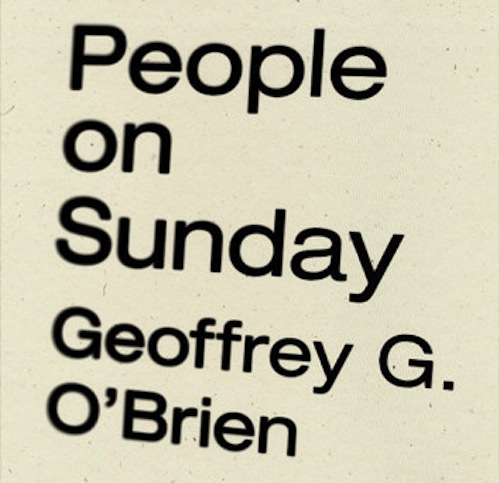Communicating Intimately With Strangers & Geoffrey G. O'Brien

Don't let this one fall through: The American Reader's Danniel Schoonebeek interviews Geoffrey G. O'Brien, whose newest book, People on Sunday (Wave Books 2013), takes its name from, as Schoonebeek notes, "Curt and Robert Siodmak’s 1930 German silent film Menschen am Sonntag, a black and white 'film without actors' that follows the lives of five citizens over the course of a Sunday in Berlin." O'Brien talks about the film, mobile pronouns, labor/leisure, the city as seen now and through Benjamin, and more. An excerpt:
Schoonebeek: As much as the poem is about leisure and languor, it’s also about work. The poem, like the film, ends with Monday and the workweek looming large. And in part the poem is so immersive because it commutes with throngs of people—through streets, “the bridges, the smoke.” Could you talk about what commuting in America is like for you? Your experience of moving with people through cities on your way to work?
O’Brien: Another way to think about the city, one for which Walter Benjamin is justly famous, especially in his work on Baudelaire, is that it continuously produces encounters and fellow-traveling (of the physical variety) with that class of people called “strangers.” In this it resembles poetry, a technology for communicating intimately with strangers, one that estranges its readers into an intimacy with the text. By contrast, the commute to or from work is an inert experience of alienation—exhausted workers facing their morning’s labor or coming back towards, but not yet at, their brief nightly reprieve from it. In the commute, strangers are your semblables, but little solidarity and connection transpire because they are also a logistical problem to be navigated (the crowd) and an unwelcome reminder of your economic and physical state of affairs. In my last book, Metropole, the also eponymous and long poem “Metropole” was quite concerned with commutes precisely for this reason—they mark a consistently missed opportunity to produce a commons, one poetry (at least some of it, at least some of the time) can and does spend its time thinking about and trying to produce, if always only in the no-place of the page.
Schoonebeek: People on Sunday was written and acted by five “non-actors,” each of them members of the working public who held down day jobs. And the public’s involvement in making art is a major thread of the poem, which also calls upon the people to take responsibility for their involvement in public life. “It’s time to change” and speak candidly about how sad it is “to be connected to somebody by so little / So briefly.” Are you after a poetry that rouses the public to participate in art? And do Americans have a responsibility to participate in public life?
O’Brien: The use of non-actors has its own specific history, but here it seems clear that the filmmakers are mounting a critique of enforced leisure, one they decided required weakening the fictive plane of the film, in part so that the film’s consumption wouldn’t be yet another moment of Sunday distraction. The actors are themselves and thus the film is, semi-oxymoronically, a contrived documentary, a reenactment of the present. The poem I wrote while watching this film worries throughout about how subjective experience can end up pitted against collective care and the formation of a public:
The four have forgotten about those who are not
In their boat but are surrounded all the same
By shoreline with unlimited populations
Maples by the water representAnd towards the end of the poem when the workweek is recommencing in the film:
Full morning already, fog in the park
Wreathing the many coming off
The double bridge, each determined again
To block out the thought of four million others
Doing Monday likewise out of sight.I don’t think a poem can form a commons, but I do think it can track the desire for one as well as the impediments to its coming into being (private pleasure on Sunday, private misery on Monday, to name the two obstacles in these passages, and the system that spans them). The poem and the book want to think about what kind of people we are on Sunday and what we’d have to do to build an article in front of that term—to be a people rather than people.
Read their full conversation at The American Reader. Recent audio of O'Brien reading from the book is up at The Claudius App, and video-feed of another such instance is at Berkeley's Holloway Poetry Series YouTube page.


